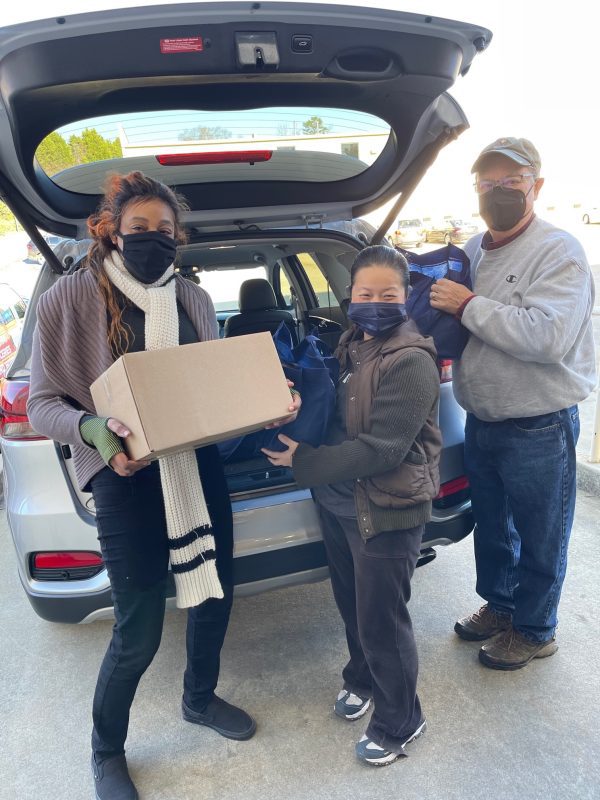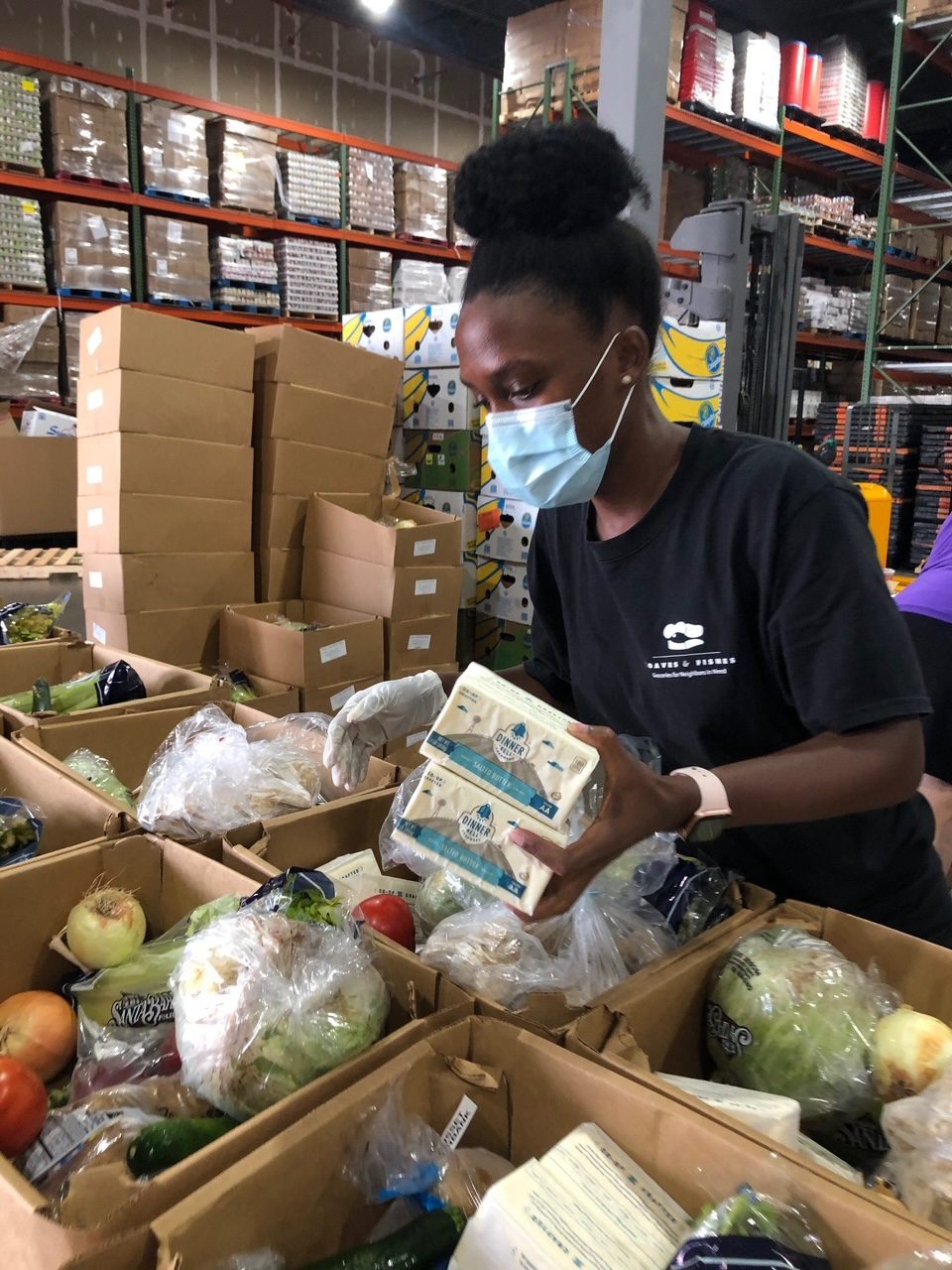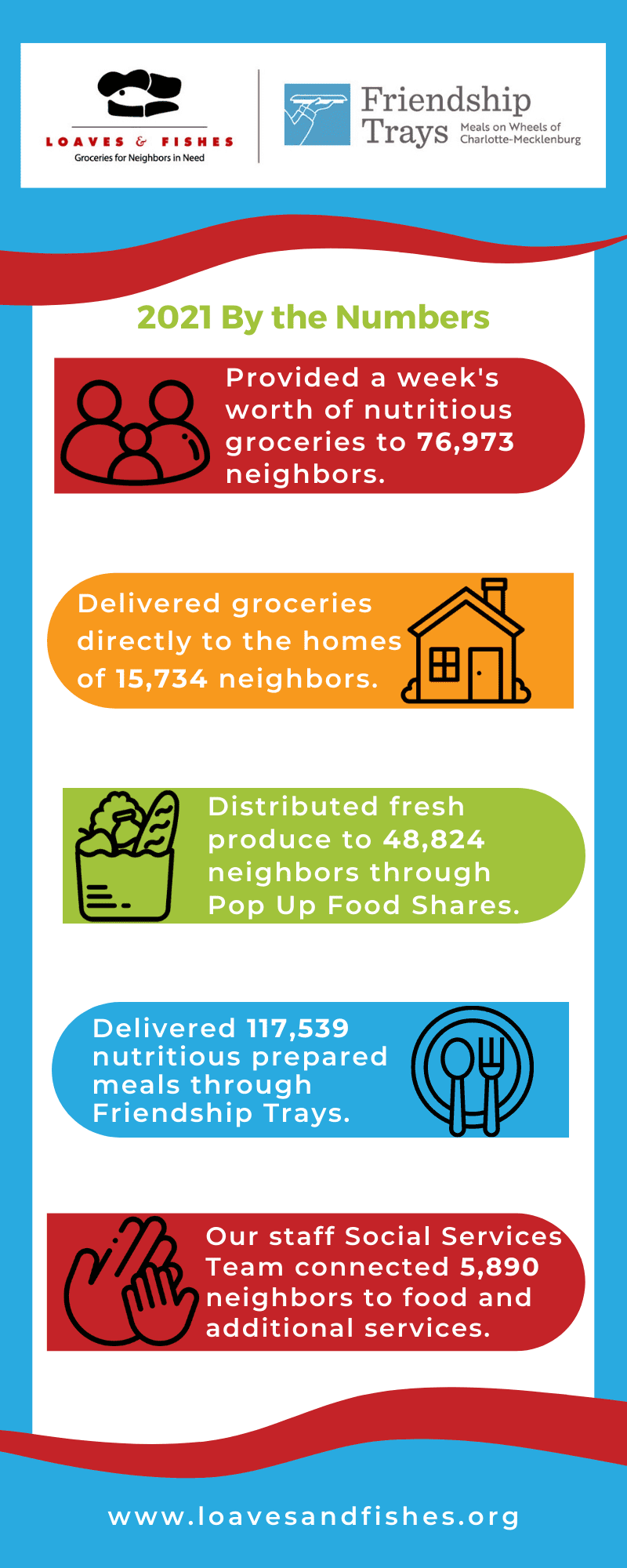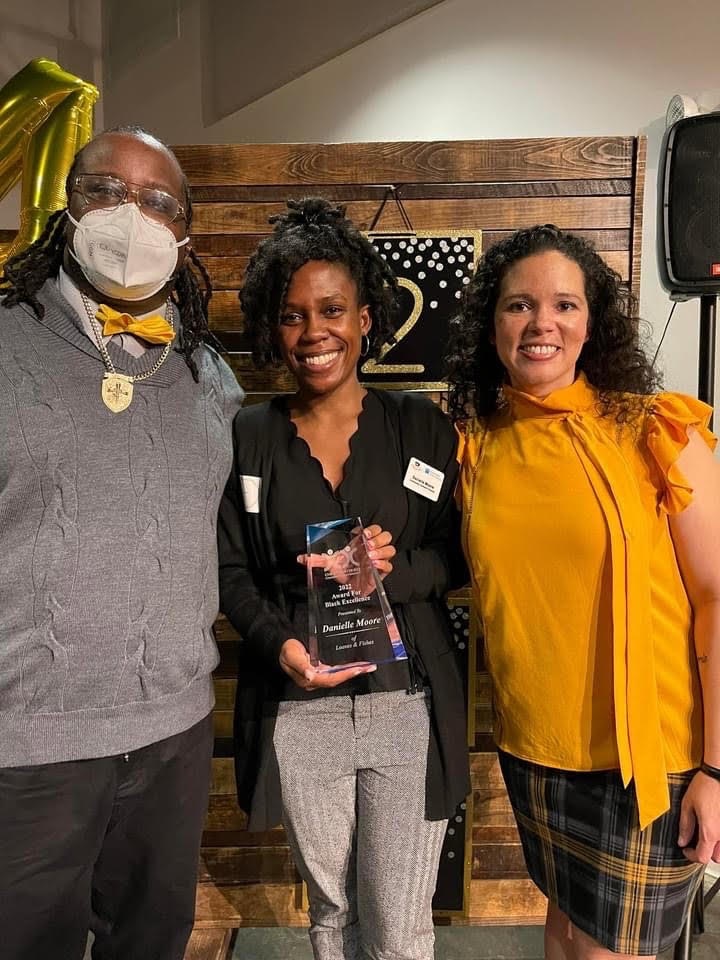UNC Charlotte Graduate Helps Feed Thousands Across the City

In 2019, Loaves & Fishes/Friendship Trays fed over 80,000 Charlotte residents, enough to fill Bank of America Stadium. In 2020, that number jumped to over 120,000.
“We saw a dramatic, overnight increase in food insecurity during the pandemic,” explained Tina Postel, CEO of Loaves & Fishes/Friendship Trays.
In May of 2021, the two organizations merged after having operated independently for over 45 years. Historically, Loaves & Fishes has offered food for pick-up at local pantries, and Friendship Trays, Charlotte’s designated Meals on Wheels program, has delivered meals to people’s homes.
They had to temporarily shut down their brick-and-mortar pantries.
“As a result, the pandemic showed us the dire need for home delivery,” Postel said, “and that the two organizations can work better as one to create a continuum approach to the complicated challenges we face.”
It forced both organizations to radically rethink operational strategies, outreach, and delivery models.
“Access is one of the key challenges to food security,” explained Director of Community Outreach and UNC Charlotte alumna Danielle Moore ’18 MPH, who interned for the nonprofit while she was in school.

“The pandemic exacerbated this in a variety of ways and pushed us towards the mobile approach.”
Currently, half of their pantries are mobile. To ensure safety, they set up in parking lots. The trucks deliver food to the site, and when clients enter the lot, staff check them in on iPads and then load the food into their vehicles.
They also have pantries on wheels called Food Pharmacies through an alliance with One Charlotte Health Alliance (OCHA), which includes Atrium and Novant Health and the Mecklenburg County Public Health Department.
Doctors and other health professionals write food prescriptions or referrals to the units that have food low in salt, sugar and fat.
“Food security is also nutritional security,” Moore explained. “We want to make sure we’re offering healthy foods, especially because many of our clients suffer from chronic health conditions. This is a critical component and part of our mission.”

In addition to leading the charge on many of these innovations, Moore also created and implemented the Grocery Home Delivery Program, which delivers healthy groceries directly to people’s doors.
It began in April 2020 as a way to safely serve clients with COVID. By the end of the year, a fleet of volunteer vehicles was loading up three days a week with both fresh and nonperishable groceries and delivering to clients all over Charlotte. The program was expanded to include anyone who wasn’t able to access their services and in nine months fed almost 8,000 Charlotteans.
In 2021, the program fed over 15,000 Charlotte residents. She is now working on piloting the online grocery shopping component of the program where clients can choose the foods delivered to their homes.
“We accomplished this by starting small and continuing to adapt,” Moore said. “Program implementation in general is about trying things, assessing impact and then adapting.”
Before being hired in 2018, Moore interned at Loaves & Fishes as she was earning her master’s degree in public health at UNC Charlotte.
Her study of chronic health conditions as an undergrad, especially those that impact Black communities and people of color, inspired her passion for public service.
“I entered public health because it combines science, health and public service. It’s about ensuring all citizens can lead healthy and productive lives, and this depends on the work of public health professionals,” she explained. “The Grocery Home Delivery Program is a combination of things I’ve learned throughout my career in public health, the master’s program and my internship.”
Moore heads the internship program at the organization, which is now very robust. When she started, there had only been about eight interns prior to her. Now there have been a total of 32, 12 of whom were UNC Charlotte interns from multiple disciplines.
“Danielle is a living, breathing example of an internship at its finest, and through it has made a radical impact in our community as well,” Postel said.
“My approach to our internship program,” Moore explained, “is to encourage the interns to find something they really enjoy and want to dig deeper into. When they do this, they naturally develop projects on ways to make operational improvements.”
Moore and her team are currently working on a nutrition education research project with the university.
“Most of our research right now is geared towards how lives are actively changed by the organization, but a new wave of program-specific research is being discussed, and that’s what I’m spearheading now,” she said.
The work they’re doing is not only expediting relief, but also trying to understand the causes of, and formulate evidence-based solutions to, hunger in Charlotte.
“Food insecurity has always been a public health crisis in the U.S.,” Moore explained. “But food itself is not the problem. There is enough food in this country to feed everyone.”
Food insecurity intersects with every social problem.
Postel cites the wage gap and the affordable housing crisis in Mecklenburg County as two of the primary drivers. “Hunger is an effect, not a cause,” Moore explained.
“In most cases, something beyond your control has caused you to be food insecure. As a result, millions of Americans are living on the edge.”
The vast majority of their clients are working families and individuals that lack access to nutritious food at least once in the course of their lives. “We see a lot of people who are gainfully employed,” Postel said.
“They’re just not making a livable wage, or they have tuition that’s due, or their car breaks down. There are a lot of people that don’t realize that there are college students, seniors on limited incomes, and hardworking families who struggle to have enough money at week’s end to put balanced food on the table.”
“I don’t think we can’t achieve food security here in America,” Moore said. “It is going to take a lot, and it’s not going to happen overnight. But there will come a time where everyone here in this country and eventually this world can and will have enough healthy food to eat.”
Postel has spent her entire career serving the public, and Moore comes from a long line of public servants.
“The emotional paycheck is infinitely more rewarding when you’re doing work that’s so meaningful to so many people,” said Postel.
Moore’s grandmother, Hattie B. Anthony, worked tirelessly for decades to address public health issues impacting Charlotte communities, including violence, education, and substance abuse, and served as the executive director of several major nonprofits.
In 2014, the Hattie B. Anthony Fighting Back Center, which is located at the Department of Public Health on Beatties Ford Road, was dedicated in her honor. “As a young girl, I heard the stories about her fierceness and passion for serving the community,” Moore said.
“She empowered people to take back their communities. She and other visionary leaders in the community continue to inspire me.”

Moore was recently honored with 2022 Black Excellence Award from Christ Centered Community Counseling for her dedicationto feed hungry neighbors and work for systemic change.
UNC Charlotte has issued the following statement on food insecurity and encourages all students and teachers to share this information:
Food insecurity is defined by the USDA as “a lack of access to enough food for an active, healthy life.” Food insecure categories include: reduced caloric intake, reduced food quality, lack of variety in diet, disrupted eating patterns, and hunger. Research shows that college students experience food insecurity at higher rates than the American household rate, and that food insecurity can negatively impact academic performance and persistence. In recognition of this problem, UNC Charlotte offers assistance to students facing food insecurity through an on-campus food pantry. The Jamil Niner Student Pantry (JNSP) is located on the east edge of campus at 1224 John Kirk Road. It has regular hours which may change from semester to semester; please see the website at https://ninerpantry.charlotte.edu resources about hunger and food insecurity among college students.